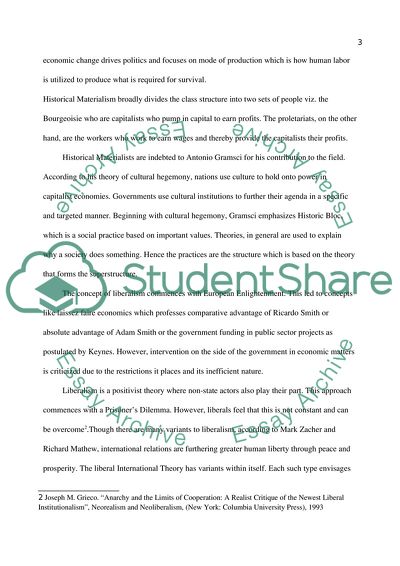Cite this document
(Historical Materialism and Liberal Approaches to Globalization Coursework Example | Topics and Well Written Essays - 3000 words, n.d.)
Historical Materialism and Liberal Approaches to Globalization Coursework Example | Topics and Well Written Essays - 3000 words. https://studentshare.org/politics/1874513-compare-and-contrast-historical-materialism-neo-gramscian-and-liberal-approaches-orthodox-neoliberalism-interventionist-and-institutional-liberals-to-globalization
Historical Materialism and Liberal Approaches to Globalization Coursework Example | Topics and Well Written Essays - 3000 words. https://studentshare.org/politics/1874513-compare-and-contrast-historical-materialism-neo-gramscian-and-liberal-approaches-orthodox-neoliberalism-interventionist-and-institutional-liberals-to-globalization
(Historical Materialism and Liberal Approaches to Globalization Coursework Example | Topics and Well Written Essays - 3000 Words)
Historical Materialism and Liberal Approaches to Globalization Coursework Example | Topics and Well Written Essays - 3000 Words. https://studentshare.org/politics/1874513-compare-and-contrast-historical-materialism-neo-gramscian-and-liberal-approaches-orthodox-neoliberalism-interventionist-and-institutional-liberals-to-globalization.
Historical Materialism and Liberal Approaches to Globalization Coursework Example | Topics and Well Written Essays - 3000 Words. https://studentshare.org/politics/1874513-compare-and-contrast-historical-materialism-neo-gramscian-and-liberal-approaches-orthodox-neoliberalism-interventionist-and-institutional-liberals-to-globalization.
“Historical Materialism and Liberal Approaches to Globalization Coursework Example | Topics and Well Written Essays - 3000 Words”. https://studentshare.org/politics/1874513-compare-and-contrast-historical-materialism-neo-gramscian-and-liberal-approaches-orthodox-neoliberalism-interventionist-and-institutional-liberals-to-globalization.


